|
|
|
Sort Order |
|
|
|
Items / Page
|
|
|
|
|
|
|
| Srl | Item |
| 1 |
ID:
159248
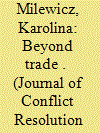

|
|
|
|
|
| Summary/Abstract |
Increased complexity and density of transnational problems create unprecedented challenges and opportunities for contemporary international governance. “Issue linkage” is one institutional arrangement through which states address these changing circumstances. In this article, we examine the widening scope of the nontrade agenda in preferential trade agreements (PTAs). Nontrade issues (NTIs) such as human rights, democracy, environment, corruption, and labor standards are increasingly linked to PTAs. This issue linkage has important implications for understanding changing patterns of international trade, including the shift to PTAs and the rise of NTIs. We show that (1) states’ choices to commit to bilateral or plurilateral versions of traditional PTAs and to PTAs with NTIs are highly interdependent, (2) states increasingly incorporate NTIs into PTAs, as the associated costs of policy change are lowered through earlier agreements, and (3) network pressures favor the increasing adoption of bilateral and especially plurilateral NTIs over time. Using an original data set on NTIs covering 522 PTAs and spanning the period 1951 to 2009, we evaluate states’ motives behind the widening nontrade agenda of trade agreements using longitudinal network modeling. We employ multiplex coevolution stochastic actor-oriented network models in a novel design to account for interdependencies within and across states’ decisions. Following a descriptive mapping of major NTIs, we evaluate our theoretical arguments. Testing against the alternative explanations of power and commitment, we find that endogenous cost considerations are the most significant factor explaining the inclusion of NTIs into PTAs.
|
|
|
|
|
|
|
|
|
|
|
|
|
|
|
|
| 2 |
ID:
159247
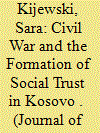

|
|
|
|
|
| Summary/Abstract |
While a new, growing subset of the literature argues that armed conflict does not necessarily erode social cohesion in the postwar era, we challenge this perspective and examine how civil war experiences shape social trust in Kosovo after the war from 1998 to 1999. Based on a nationwide survey conducted in 2010 and the disaggregated conflict event data set of the Armed Conflict Location & Event Data Project, we simultaneously analyze the impact of individual war-related experiences and exposure to war in the community through hierarchical analyses of twenty-six municipalities. Our findings confirm that civil war is negatively related to social trust. This effect proves to be more conclusive for individual war experiences than for contextual war exposure. Arguably, the occurrence of instances of violence with lasting psychological as well as social structural consequences provides people with clear evidence of the untrustworthiness, uncooperativeness, and hostility of others, diminishing social trust in the aftermath of war.
|
|
|
|
|
|
|
|
|
|
|
|
|
|
|
|
| 3 |
ID:
159246
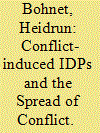

|
|
|
|
|
| Summary/Abstract |
Recent scholarship has found evidence that refugee flows may inadvertently contribute to the spread of conflict across borders. Little is known, however, about the spatial diffusion of conflict within a state’s borders and what role internal displacement plays in such a dynamic. This question is of relevance because of the particular marginalization of internally displaced persons, which make them at risk of predation and militarization by armed groups. Drawing on a novel global data set on internal displacement, we evaluate this question and find evidence for a similar mechanism leading to conflict spread operating at the domestic level.
|
|
|
|
|
|
|
|
|
|
|
|
|
|
|
|
| 4 |
ID:
159251
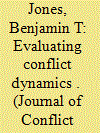

|
|
|
|
|
| Summary/Abstract |
Interest in processes has become increasingly pronounced in international conflict research in recent years, especially how these processes unfold across time “dynamics”. We focus in particular on “stage conceptions” of dynamics: processes that unfold over a series of sequential, and possibly recurrent, stages. We suggest that stage conceptions have two key properties: plurisectality and conditional covariate effects. We propose a novel econometric application to quantitatively assess claims regarding stage conceptions of dynamics: survival modeling. Specifically, we use multistate models to examine how a process evolves through its individual stages, and also whether covariate effects differ across these stages. We use Huth and Allee’s territorial dispute data to demonstrate the importance of conceptualizing conflict as a dynamic process, as well as empirically modeling it as such. We show democracy has different effects on dispute resolution, depending on the dispute’s stage, but that these different effects disappear after time passes.
|
|
|
|
|
|
|
|
|
|
|
|
|
|
|
|
| 5 |
ID:
159253
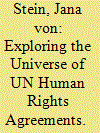

|
|
|
|
|
| Summary/Abstract |
The international human rights (HR) regime is vast and complex. Yet, most of what we know about it draws from a handful of agreements, often chosen for their prominence and/or perceived centrality to the HR project. This article argues that HR research needs to expand its scope to encompass all agreements in this realm, and presents a new data resource that enables scholars to accomplish that goal. Using the data, I demonstrate that the literature has painted an unrepresentative portrait of HR agreements. In addition to making comprehensive analysis possible, the database moves the literature forward by (1) taking into account important legal distinctions in the process of making treaties binding, (2) providing information on treaty design, and (3) considering relationships between agreements. I present several applications and discuss future areas of inquiry. Network analysis and the linking of treaty participation to HR outcomes are two notable areas of interest.
|
|
|
|
|
|
|
|
|
|
|
|
|
|
|
|
| 6 |
ID:
159250
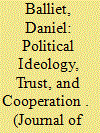

|
|
|
|
|
| Summary/Abstract |
Theories suggest that political ideology relates to cooperation, with conservatives being more likely to pursue selfish outcomes, and liberals more likely to pursue egalitarian outcomes. In study 1, we examine how political ideology and political party affiliation (Republican vs. Democrat) predict cooperation with a partner who self-identifies as Republican or Democrat in two samples before (n = 362) and after (n = 366) the 2012 US presidential election. Liberals show slightly more concern for their partners’ outcomes compared to conservatives (study 1), and in study 2 this relation is supported by a meta-analysis (r = .15). However, in study 1, political ideology did not relate to cooperation in general. Both Republicans and Democrats extend more cooperation to their in-group relative to the out-group, and this is explained by expectations of cooperation from in-group versus out-group members. We discuss the relation between political ideology and cooperation within and between groups.
|
|
|
|
|
|
|
|
|
|
|
|
|
|
|
|
| 7 |
ID:
159252


|
|
|
|
|
| Summary/Abstract |
We seek a more accurate review of, and reflection on the gender and international relations (IR) literature than that offered by Reiter. Our evaluation corrects misunderstandings related to key dichotomies (mis)used in analyzing scholarship: sex/gender, positivism/nonpositivism, and epistemology/ontology. It also underscores the comparative strengths and weaknesses of different types of research in order to identify more fruitful possibilities for synthesis. We make the pluralist case that gender and IR research is at its best when it is multimethod, epistemologically pluralist, multisited, and carefully navigates the differences between feminist analyses and large-n statistical studies. The potential payoff of careful, synergistic engagement is worth any risks.
|
|
|
|
|
|
|
|
|
|
|
|
|
|
|
|
| 8 |
ID:
159249


|
|
|
|
|
| Summary/Abstract |
If peace fails due to incomplete information and incentives to misrepresent power or resolve, war is supposed to serve as a learning process and allows parties to reach a mutually preferable bargain. We explore crisis bargaining under a third type of uncertainty: the extent to which one side wishes to conquer the other. With incomplete information and take-it-or-leave-it negotiations, this type of uncertainty is isomorphic to incomplete information about the probability of victory. However, with incomplete information and bargaining while fighting, standard convergence results fail: types fail to fully separate because there is no differential cost for delay. Wars correspondingly last longer while benefiting no one. These results help explain empirical differences between territorial versus nonterritorial conflicts and interstate versus intrastate wars.
|
|
|
|
|
|
|
|
|
|
|
|
|
|
|
|
|
|
|
|
|